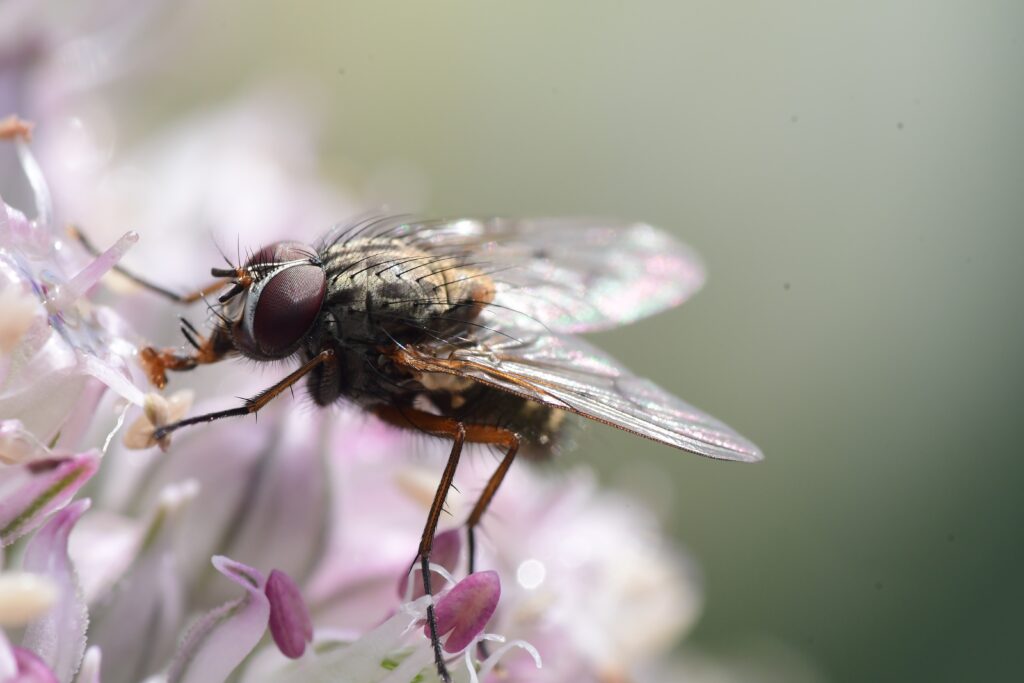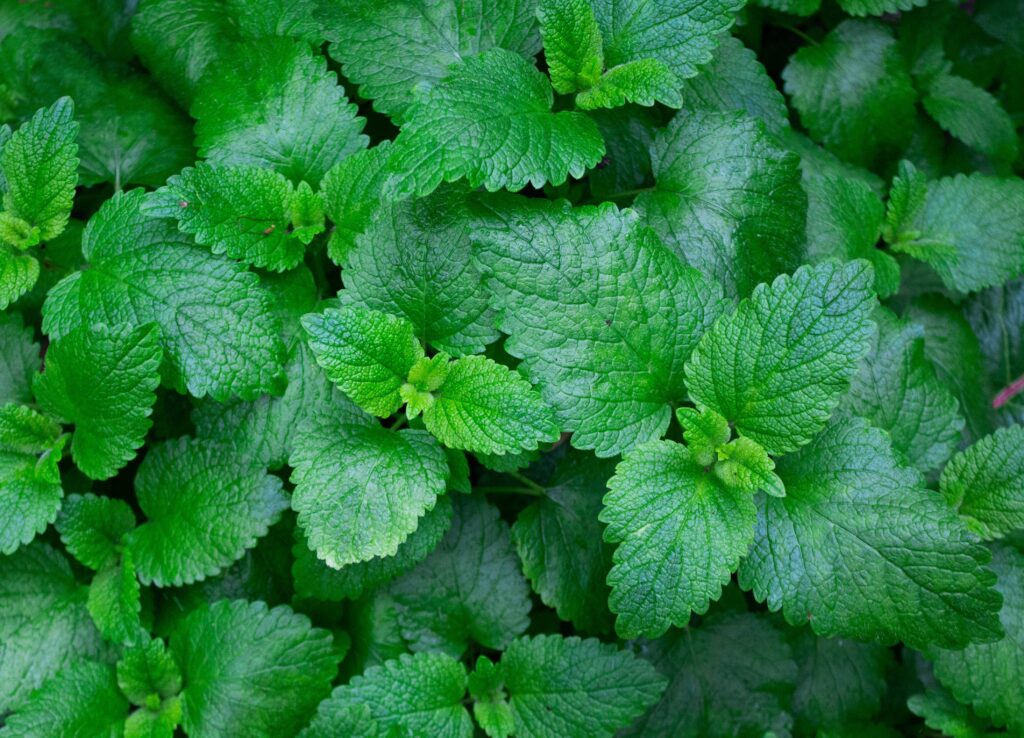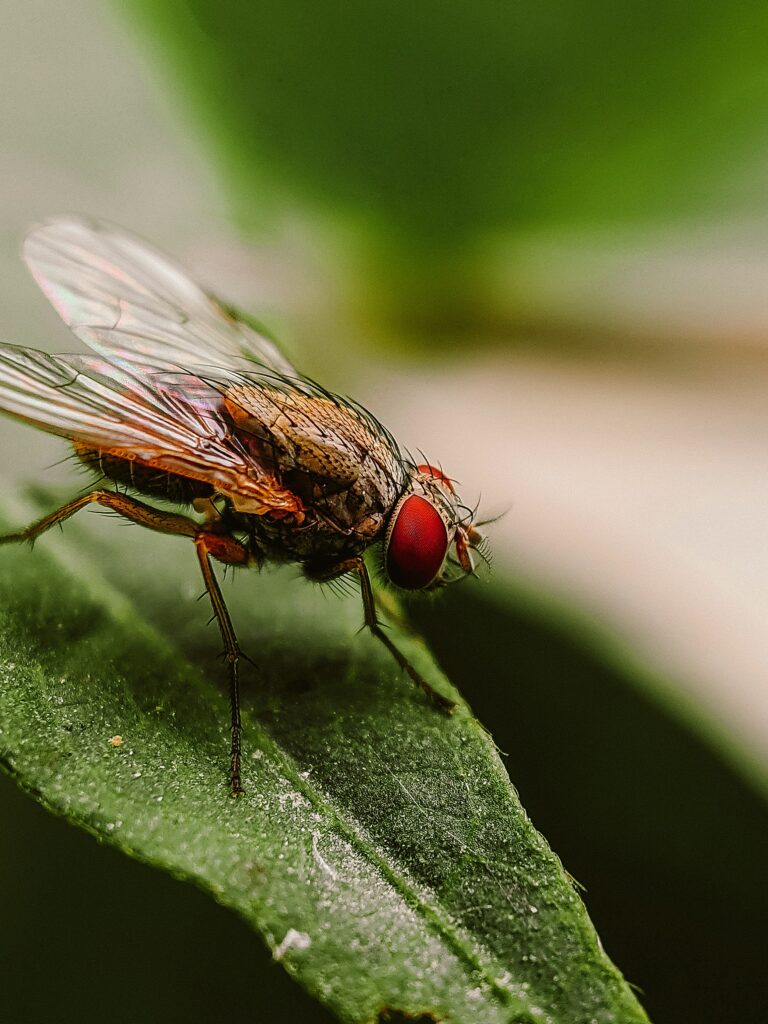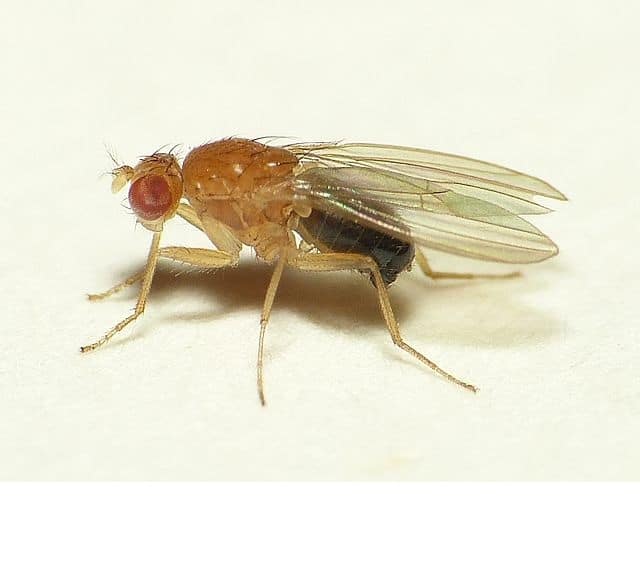If you’re noticing fruit flies around your plants, it typically indicates the presence of decaying organic matter or overripe fruits in the vicinity. Fruit flies are attracted to the fermenting sugars and yeasts that are produced during decomposition. Here are a few common reasons why fruit flies may be around your plants:
- Overripe fruits: If you have ripe or overripe fruits nearby, such as on a kitchen counter or in a fruit bowl, fruit flies may be drawn to them. Fruit flies are particularly attracted to fruits like bananas, melons, and berries that are in a state of decay.
- Potted plants with organic matter: Fruit flies can also breed in the soil of potted plants if there is decaying organic matter present. This can occur if you’ve used organic compost or if fallen leaves, fruit debris, or other organic material has accumulated in the potting mix.
- Excess moisture: Overwatering your plants or having poor drainage can create a moist environment that is conducive to fruit fly breeding. Excessive moisture can lead to the growth of fungus or mold, which can serve as a food source for fruit flies.
To help address the issue of fruit flies around your plants, consider the following steps:
- Remove overripe fruits: Dispose of any overripe fruits that may be attracting fruit flies. Keep your fruits stored in sealed containers or in the refrigerator to prevent fruit fly infestations.
- Clean the plant area: Remove any decaying plant matter or fallen leaves from the vicinity of your plants, both indoors and outdoors. This will eliminate potential breeding sites for fruit flies.
- Check the potting mix: Inspect the soil of your potted plants for any signs of decaying organic matter. If necessary, remove any affected soil and replace it with fresh, well-draining soil.
- Maintain proper watering: Avoid overwatering your plants and ensure that they have adequate drainage. Allow the top layer of soil to dry out between waterings to discourage fruit fly breeding.
- Use traps: You can set up fruit fly traps near your plants to capture adult flies. These traps can be purchased or made using simple materials like a container with a small opening and a mixture of apple cider vinegar and dish soap.
By taking these measures, you can help reduce the attractiveness of your plants to fruit flies and minimize their presence. However, if the infestation persists or becomes overwhelming, it may be helpful to consult with a pest control professional for further assistance.
What are Fruit Flies?
Fruit flies, scientifically known as Drosophila melanogaster, are small insects belonging to the family Drosophilidae. They are commonly found in homes, kitchens, and areas where decaying organic matter is present. Fruit flies are known for their rapid reproduction and short lifecycle.
Here are some key characteristics of fruit flies:
- Appearance: Fruit flies are small, usually measuring about 1/8 inch (3-4 mm) in length. They have a tan or brownish body with red eyes. The body is typically slender and oval-shaped.
- Behavior: Fruit flies are attracted to fermenting or rotting organic matter, particularly fruits and vegetables. They are highly agile fliers and can move quickly in short bursts. Fruit flies are known for their ability to reproduce rapidly, with females laying hundreds of eggs at a time.
- Lifecycle: The lifecycle of a fruit fly consists of four stages: egg, larva, pupa, and adult. The entire lifecycle can take as little as 8-10 days under favorable conditions, allowing for quick population growth.
- Food sources: Fruit flies primarily feed on decomposing fruits and vegetables, as well as other organic materials like moist bread, spilled beverages, and fermenting liquids. They are particularly attracted to fruits that are overripe, damaged, or in the early stages of decay.
- Distribution: Fruit flies are found worldwide and are commonly encountered in homes, grocery stores, restaurants, and other places where food is present. They can be more prevalent in warmer climates or during the summer months.
While fruit flies are considered a nuisance, they are generally harmless and do not pose significant health risks. However, their presence can be a sign of poor sanitation or food storage practices. Proper hygiene, such as promptly removing and disposing of overripe fruits and vegetables, keeping kitchen surfaces clean, and ensuring proper garbage disposal, can help prevent fruit fly infestations.
If you’re dealing with a persistent fruit fly problem, it may be helpful to employ control methods such as using traps or contacting a pest control professional for assistance.
Best Ways to Get Rid of Fruit Flies?
Use vinegar traps. To get rid of fruit flies, it’s important to eliminate their breeding sources and use effective trapping methods. Here are some steps you can take to control and eliminate fruit flies:

- Remove attractants: Dispose of overripe fruits and vegetables, both on the counter and in the refrigerator. Clean up any spilled liquids, fruit juice, or food debris that may be attracting fruit flies. Check for hidden sources of decay, such as potatoes or onions, and remove them.
- Clean surfaces: Thoroughly clean kitchen countertops, sinks, and other areas where fruit flies are present. Wipe down surfaces with a mixture of vinegar and water or a mild household cleaner to remove any organic residue.
- Empty and clean garbage bins: Ensure that your garbage bins are tightly sealed and empty them regularly to prevent fruit flies from breeding in decaying organic matter. Clean the bins with a disinfectant to remove any lingering odors.
- Store fruits and vegetables properly: Keep fruits and vegetables in sealed containers or in the refrigerator to minimize their exposure to fruit flies. Consider storing fruits that are prone to ripening quickly, such as bananas or peaches, in the refrigerator.
- Use vinegar traps: Fruit flies are attracted to the scent of vinegar. Fill a small bowl or cup with apple cider vinegar, cover it with plastic wrap, and secure the wrap with a rubber band. Poke a few small holes in the plastic wrap to allow fruit flies to enter. The flies will be attracted to the vinegar and become trapped inside the container.
- Make a fruit fly trap: Create a homemade trap by placing a piece of ripe or overripe fruit in a jar and covering it with plastic wrap. Punch small holes in the plastic wrap to allow the fruit flies to enter. The flies will be attracted to the fruit and become trapped inside the jar.
- Use commercial fruit fly traps: There are various commercially available fruit fly traps, such as sticky traps or liquid-based traps, that can effectively capture fruit flies. Follow the instructions provided with the traps for optimal results.
- Maintain cleanliness and vigilance: Regularly clean your kitchen and dining areas to prevent the buildup of food debris or spills that could attract fruit flies. Regularly empty and clean drains to remove any organic material that could serve as a breeding ground for fruit flies.
By combining these methods and being consistent in your efforts, you can significantly reduce the population of fruit flies and prevent future infestations. It’s important to note that fruit flies have a short lifecycle, so it may take a few weeks to completely eliminate them.
Are Fruit Flies Safe to Have Around my Plants?

Yes. Having fruit flies around your plants is generally not a cause for concern in terms of direct harm to the plants themselves. Fruit flies primarily feed on decaying organic matter, such as overripe fruits and vegetables, rather than healthy plant tissue. However, their presence can be an annoyance and indicate less-than-ideal conditions in your environment.
Here are a few reasons why fruit flies around your plants may be problematic:
- Attracting other pests: Fruit flies can be a sign of other pest infestations, such as aphids or scale insects, which may pose a risk to your plants. These pests can cause damage by feeding on plant sap or leaves. It’s important to monitor your plants for signs of these pests and take appropriate action if necessary.
- Spreading disease: Fruit flies can potentially carry and spread plant diseases if they come into contact with infected plants. Although this is less common than with other types of pests, it’s still a possibility. Proper hygiene and care for your plants, such as removing infected plant material, can help minimize the risk of disease spread.
- Potential for fruit fly breeding: Fruit flies require decaying organic matter to lay their eggs and complete their life cycle. If you have fallen or decaying plant material in the soil or surrounding area, fruit flies may use it as a breeding site. This can lead to an increase in their population and become a nuisance.
To address the presence of fruit flies around your plants, it’s recommended to follow the steps outlined earlier to eliminate their breeding sources and use traps to capture adult flies. By maintaining cleanliness, removing decaying organic matter, and addressing any underlying pest issues, you can help prevent fruit flies from becoming a significant problem for your plants.
If you’re concerned about the health of your plants or the impact of fruit flies, it’s always a good idea to consult with a local plant expert, such as a horticulturist or a plant nursery, who can provide specific guidance based on the characteristics of your plants and their environment.
What is the Best Way to Prevent Fruit Fly Infestations?

Preventing fruit fly infestations requires a combination of good hygiene practices and proactive measures. Here are some effective strategies to help prevent fruit fly infestations:
- Proper storage of fruits and vegetables: Store ripe or overripe fruits and vegetables in sealed containers or in the refrigerator. This prevents fruit flies from accessing and breeding in these food sources.
- Regularly clean and maintain kitchen surfaces: Clean countertops, sinks, and other food preparation areas regularly to remove any food residue or spills that could attract fruit flies. Pay attention to hidden areas and crevices where organic matter can accumulate.
- Dispose of organic waste properly: Promptly dispose of kitchen waste, such as fruit peels, vegetable scraps, and other organic matter, in sealed trash bags or compost bins. Empty and clean trash cans frequently to prevent fruit flies from finding breeding sites.
- Clean drains: Fruit flies can breed in moist, organic matter accumulated in drains. Regularly clean and flush drains with a mixture of hot water and vinegar or a commercial drain cleaner to remove any potential breeding sites.
- Seal entry points: Inspect doors, windows, and other openings for any gaps or cracks that could serve as entry points for fruit flies. Seal these openings with weatherstripping or caulk to prevent their entry into your home.
- Monitor and remove overripe fruits: Check fruits regularly and remove any that are overripe or starting to decay. These are attractive breeding sites for fruit flies. Dispose of them properly or use them immediately.
- Maintain a clean garden: If you have outdoor plants or a vegetable garden, ensure that fallen fruits or vegetables are promptly removed and not left to rot on the ground. Regularly inspect plants for signs of pest infestations and take appropriate action to control them.
- Use preventive traps: Set up fruit fly traps, such as vinegar traps or commercially available traps, as a proactive measure to capture any fruit flies that may enter your home. These traps can help reduce the population of fruit flies before they become a larger problem.
By implementing these preventive measures, you can significantly reduce the likelihood of fruit fly infestations and keep your home and plants free from these pests. Consistency and attention to cleanliness are key to maintaining a fruit fly-free environment.
What Type of Plants Repel Fruit Flies?

While there isn’t a specific type of plant that is known to repel fruit flies completely, there are certain plants that have natural properties that may help deter or reduce their presence. Here are a few examples:
- Basil (Ocimum basilicum): Basil has a strong scent that can help repel fruit flies and other insects. Consider growing basil plants near areas where fruit flies are commonly found, such as near fruit bowls or kitchen windows.
- Mint (Mentha spp.): Mint plants, like spearmint or peppermint, have a strong aroma that can act as a deterrent to fruit flies. Planting mint in pots near windows or doors can help discourage fruit flies from entering your home.
- Lavender (Lavandula spp.): Lavender is known for its fragrant flowers, which can help repel fruit flies and other insects. Planting lavender in outdoor areas near entry points or windows can assist in keeping fruit flies away.
- Marigold (Tagetes spp.): Marigolds have a distinct scent that can deter fruit flies and other pests. Plant marigolds in your garden or near windows and doorways to help reduce the presence of fruit flies.
While these plants may have some repellent properties, it’s important to note that their effectiveness in repelling fruit flies may vary. Additionally, relying solely on these plants may not completely eliminate fruit fly infestations if other attractants or breeding sources are present.
To effectively control fruit flies, it’s best to focus on implementing good sanitation practices, removing attractants, and using traps or other control methods as needed. By combining these approaches, you can minimize the presence of fruit flies and maintain a healthier environment for your plants and home.
Do Fruit Flies Bite Humans?
No, fruit flies do not bite humans. Fruit flies primarily feed on decaying fruits and vegetables, and they do not have the ability to bite or sting. They are attracted to sugary substances and may fly around humans in search of these food sources, but they do not pose a direct threat to human health.
However, it’s important to note that fruit flies can be a nuisance when they are present in large numbers. They are small, agile insects that can be bothersome as they fly around, particularly in areas where ripe or overripe fruits are present. Fruit flies are more of a nuisance pest than a biting insect.
If you are experiencing issues with fruit flies in your home, implementing preventive measures, such as proper food storage, cleanliness, and using traps, can help manage their population and reduce their presence.
What Type of Plants Attract Fruit Flies?

Fruit flies are attracted to decaying organic matter, particularly fruits and vegetables that are ripe, overripe, or starting to decay. Here are some types of plants or conditions that can attract fruit flies:
- Ripe and overripe fruits: Fruits like bananas, apples, peaches, melons, and berries are highly attractive to fruit flies. As these fruits ripen and begin to decay, they release ethylene gas, which acts as a signal to fruit flies that the fruit is a suitable food source.
- Vegetables: Some vegetables can also attract fruit flies when they start to spoil or decompose. Examples include tomatoes, cucumbers, zucchini, and potatoes. Fruit flies are particularly drawn to soft, mushy, or rotting vegetables.
- Fermenting or sugary substances: Fruit flies are also attracted to fermenting liquids or sugary substances. This includes spilled fruit juice, alcoholic beverages, soda, and even honey or sugary syrups.
- Compost piles: Fruit flies are often found around compost piles or bins where organic matter, including fruit and vegetable scraps, is decomposing. The warm and moist environment of compost piles is conducive to fruit fly breeding.
- Flowering plants: While fruit flies are not primarily attracted to flowering plants, they may be drawn to them indirectly. If flowers have fallen or started to decay, they can provide a food source for fruit flies.
It’s important to note that fruit flies are not attracted to healthy, unspoiled fruits and vegetables. They are more attracted to the scent of ripening or decaying organic matter. Properly storing fruits and vegetables, promptly removing overripe or spoiled produce, and maintaining cleanliness in the kitchen can help reduce fruit fly attraction and infestation.
Are Fruit Flies Harmful to Humans?
No. Fruit flies are generally not harmful to humans in terms of direct health risks. They do not bite, sting, or transmit diseases to humans. Fruit flies primarily feed on decaying organic matter, such as overripe fruits and vegetables, and are attracted to sweet and sugary substances.
However, fruit flies can be a nuisance when they infest homes or areas where fruits and vegetables are present. They are small insects that can be bothersome as they fly around, particularly in the kitchen or dining areas. Fruit flies are known for their rapid reproduction and can quickly become a nuisance if their population is not controlled.
While fruit flies themselves do not pose significant health risks, their presence can indicate unsanitary conditions or the presence of decaying organic matter that may attract other pests or contribute to bacterial growth. It is important to address the underlying issues that attract fruit flies, such as maintaining cleanliness, proper food storage, and eliminating breeding sources.
If you are dealing with a fruit fly infestation and it becomes a persistent problem, it is recommended to employ control measures such as using traps, practicing good sanitation, and removing attractants to manage their population effectively.
Are Fruit Flies Harmful to Pets?

Fruit flies are generally not harmful to pets. They do not bite, sting, or pose any direct health risks to cats, dogs, or other pets. Fruit flies primarily feed on decaying organic matter, particularly fruits and vegetables, and are attracted to sugary substances.
If you have pets, it’s recommended to address the underlying issues that attract fruit flies, such as maintaining cleanliness, proper food storage, and eliminating breeding sources. This can help create a healthier environment for your pets and reduce the likelihood of attracting other pests.
While fruit flies themselves are not harmful to pets, it’s always a good idea to monitor your pets’ behavior and health. If you notice any unusual symptoms or changes in behavior in your pets that you suspect may be related to pests or other environmental factors, it’s best to consult with a veterinarian for appropriate guidance and advice.

